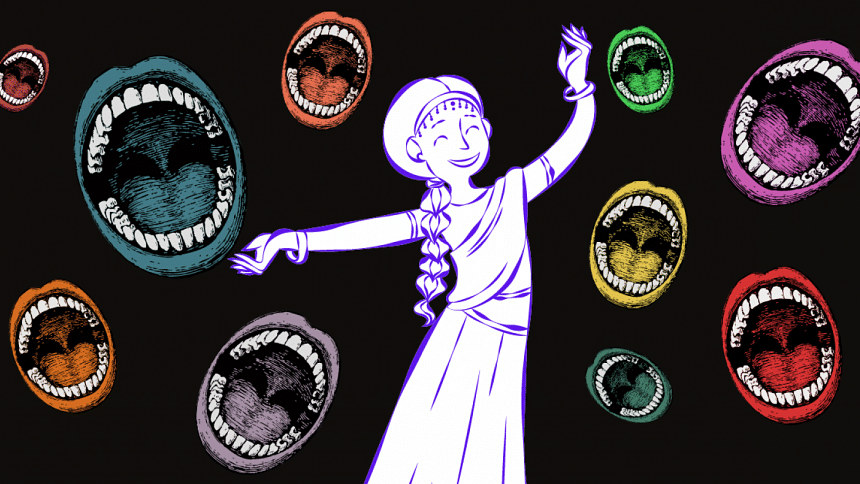A scooter and a teep: Misogyny, in public and private

That day, like every other day, I got ready for work at 8am and put on a teep, without giving it much thought. It was the first day of Ramadan; at 8:30am, the traffic was already crazier than usual. I attempted to keep the madness at bay, as we do, by delving into the world of news, on this occasion looking for updates on Maisha Momtaz Meem (21), the NSU student killed by a covered van that hit her scooter while she was on her way to her university on April 1.
What I found instead were zealous netizens—mostly men—dissecting Meem's attire, cursing her parents for allowing her to own a scooter, and saying she deserved to die for her transgressions. They appointed themselves judge and jury and volunteered for her virtual execution. Hardly anyone addressed the question of road safety, despite having witnessed two massive popular movements demanding safe roads in the last four years. The onus was, once again, on the victim, who happened to be an independent woman. I feel the same "heat" every time I am out on my cycle, with almost every speeding car trying to push me aside.
Reeling from this onslaught, I logged on to Facebook to find my feed inundated by my feminist friends' new teep-adorned profile photos, protesting the verbal and physical abuse directed by a policeman, Nazmul Tareque, at Lata Samaddar, a teacher at Tejgaon College, while she was on her way to work. She filed a general diary against the perpetrator, resulting in his suspension. Lata's bold move was widely appreciated, although many netizens—mostly men—were not quite so thrilled. Once again, they unleashed their rage against women, schooling them on their attire, dispensing fatwas, and calling every teep-wearing woman a prostitute who is "asking for it." Women's organisations, feminists and allies, MPs, and cultural activists condemned such violence against women in public spaces—but that did not stop the trolls.
Many protesters saw it as an attack on our cultural heritage—an example of heightened patriarchal-fundamentalist moral policing. Most were vocal about the right to wear whatever one pleases. Some circulated old photos of their parents/grandparents wearing teeps, while some dug out images of Dhaka University students clad in sarees with sleeveless blouses and teeps in the 1970s. Renowned singer Ferdausi Rahman reminisced about how they had protested for their right to wear teeps and sing in the Pakistan era. Our cultural revolutionaries were an integral part of our independence movement, and it is women whose bodies have been used as repositories of both tradition and modernity, becoming a battleground for ideological domination (hijab/"fundamentalist" vs saree/"secular" and so on).
Born into a dogmatic secular family and raised by a practising Muslim Nani (who was a radical feminist in her own right), I somewhat embody these secular anxieties, although my multiple allegiances keep my politics grounded. I am the fasting-praying, singing-dancing, running-cycling, saree-jeans wearing academic and a feminist who happens to be a Muslim—an oxymoron in every possible sense. And I have every right to be—the same as Lata or Meem. I don't find the religious-secular trope useful in thinking about the causes of violence against women—the problem is much larger than that.
However, when we circulate our old photos of "secular" days, we forget that we are talking about a handful of educated, elite or middle-class women. Women have been encroaching onto a much larger political field since independence, and their visibility in the public sphere has increased manyfold. Throughout the 1980s-1990s, the state sold the image of empowered women to pander to donor agencies while also keeping close ties with the US and the "Islamic world" for direct foreign investments. Along with the aid, investment and remittance came discourses of "women's empowerment" and the "politics of piety." Neoliberal Bangladesh embraced contesting ideologies and politics—which of these changes are we to deny?
That's why I would much rather focus on the content of the trolls—the mindless misogyny directed at both Meem and Lata. The attacks reveal a convoluted masculine rage fanned by class angst and other forms of repression that simply cannot accommodate the idea of the independent woman; their blinding rage is even ready to condone murder. A recent study conducted by Manusher Jonno Foundation and Dnet found that 81 percent of their 518 interlocutors across 16 districts held negative perceptions of free-spirited women. Of them, 39 percent were women; you can imagine what the men had to say.
Who are these women, and why do they pose such a threat to mankind? The trolls reveal quite clearly that these are women who raise their voices and claim the freedom to choose how they want to live their lives. How is this constituted as a threat? Is it not natural for a human being to do what their heart desires, as long as it does not infringe on others' rights? Or do these people seriously think women must cease to exist in the public realm?
Postcolonial women have for long suffered from a Victorian moral hangover. Women are meant to assume the role of a domestic goddess, a sovereign of the husband's heart, a nurturing mother, and a sacrificial lamb who will go to any length to protect her family—in short, become a virtue-signalling, subservient, respectable woman. In return, the husband will provide for her and the family, and protect her from "worldly" affairs. Theoretically, we know that the moment production was removed from the domestic realm, women were reduced to a reproductive force and relegated to second-class status. It is almost impossible to track this in pre-colonial Bengal as we are still the "people without history," and women's economic roles at home are yet to be recognised. Nevertheless, our predecessors, who experienced and participated in anti-imperialist movements and the Liberation War, brought women's rights to the centre of revolutionary politics and thereby reconfigured their Victorian morals. Since then, women have taken part in nation-building and fought relentlessly for their equal rights as citizens. And yet, after all these battles, neither education and earning a living, nor conforming to the ideal role of a homemaker allows women to claim private or public spaces as theirs. We have unequal laws, patriarchal families, and the state to blame for it.
Women have faced discrimination and structural violence at home for centuries, yet somehow it is still considered a safer and more respectable space for them. Access to resources and space has always been conditional upon men, cloaked under the guise of women's safety and protection. For centuries, men have been "spreading" themselves, physically and ideologically occupying both domestic and public spheres. Women, on the other hand, are made to shrink themselves and occupy less space, curtail their desires, and mould themselves in the shape of impossible ideals. As Shilpa Phadke has argued, women can only exist in public spaces with a "purpose"—be it work, shopping or picking up school-going children; to exist otherwise is to be questioned, surveilled, policed or, worse, brutalised.
Society exists by consuming women's (underpaid or unpaid) labour, and the state continues to use women's faces as banners for their development goals. Yet, far from ensuring women's rights as equal citizens and human beings, both the state and society sanction and benefit from violence against women. We cannot wait around forever. Demand the human right to exist—without being violated, and without the need for protection. Fight for our right to the city, for the right to take risks, to occupy the offices and the streets as much as our homes. It is time to reimagine our city—a city where I can ride my bike without being run over or recorded by a stranger, where Lata can wear whatever she wants, and Meem can ride her scooter home safely without being questioned about her clothes, her movements or her company. We cannot wait for the patriarchy to be fully "smashed" before we can imagine and claim this city as ours.
Dr Seuty Sabur teaches anthropology at the Department of Economics and Social Sciences in Brac University.

 For all latest news, follow The Daily Star's Google News channel.
For all latest news, follow The Daily Star's Google News channel. 



Comments